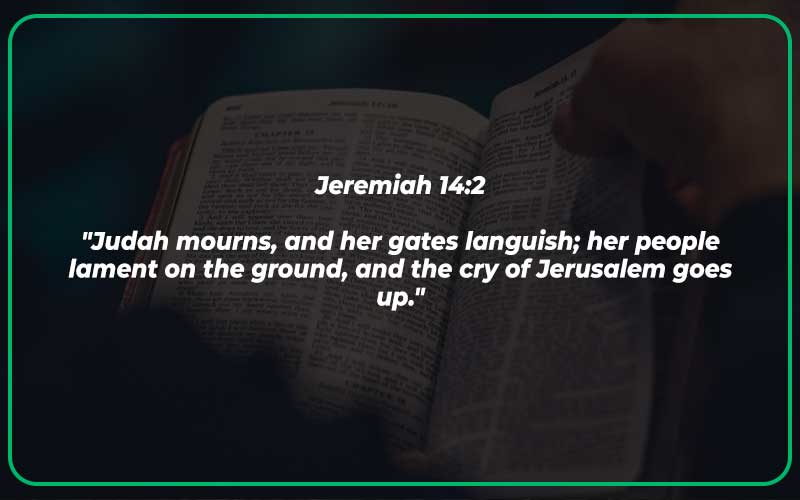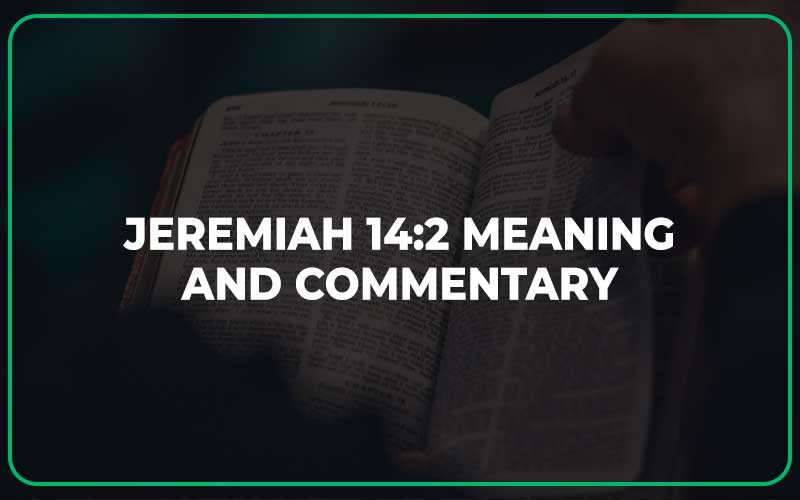Jeremiah 14:2
“Judah mourns, and her gates languish; her people lament on the ground, and the cry of Jerusalem goes up.”
Jeremiah 14:2 Meaning
Jeremiah 14:2 depicts a scene of sorrow and despair in the land of Judah. The people are mourning, the city gates are in a state of decay, and the cry of anguish can be heard in Jerusalem. It reveals the devastating consequences of the people’s disobedience and the judgment that has befallen them.
Jeremiah 14:2 Commentary and Explanation
Jeremiah 14:2 paints a vivid and poignant picture of a dire situation that calls for our reflection and understanding.
First and foremost, we must recognize that the book of Jeremiah is a prophetic book in the Old Testament, authored by the prophet Jeremiah himself. Jeremiah lived during a tumultuous period in Israel’s history, witnessing the decline and eventual fall of the kingdom of Judah. The verse in question, Jeremiah 14:2, takes place in a time when the nation is suffering the consequences of its disobedience and idolatry.
When the verse mentions that the people “mourn,” it reflects the deep sorrow and anguish they are experiencing. This mourning is not just a response to the immediate circumstances but also a lament for the spiritual condition of the nation. The people are not merely grieving a temporal loss but also the estrangement from God due to their sinful ways. This sentiment is echoed in other parts of the Bible, such as Psalm 34:18, where it is affirmed that “The Lord is near to the brokenhearted and saves the crushed in spirit.”
Furthermore, the fact that they “sit in silence on the ground” indicates a profound sense of helplessness and a need for self-reflection. In the Bible, sitting in silence often signifies a period of introspection and a recognition of one’s need for God’s intervention. This practice can be found in passages like Lamentations 3:28-29, which reminds us, “Let him sit alone in silence when it is laid on him; let him put his mouth in the dust—there may yet be hope.”
Jeremiah 14:2 serves as a stark reminder of the consequences of turning away from God. The people’s mourning and silence reflect the heavy burden of their sins and the realization that their disobedience has led to their current predicament. It calls us to examine our own lives and hearts, prompting us to repent and turn back to God in times of trouble. Just as the people of Judah sought God’s mercy and restoration, we too can find hope and redemption in our Heavenly Father, as expressed in Isaiah 55:6-7: “Seek the Lord while he may be found; call upon him while he is near; let the wicked forsake his way, and the unrighteous man his thoughts; let him return to the Lord, that he may have compassion on him.”
Jeremiah 14:2 invites us to meditate on the spiritual implications of our actions and choices. It reminds us that in times of distress and spiritual drought, we must humble ourselves, seek God’s face, and turn away from our sinful ways. Through repentance and reliance on God’s mercy, we can find hope, restoration, and a renewed relationship with our Creator, just as the people of Judah longed for in their mourning and silence.
Also Read: Luke 12:27 Meaning and Commentary
Context of Jeremiah 14:2
Jeremiah was a prophet who was called by God to deliver His messages to the people of Judah. The nation had fallen into idolatry and wickedness, forsaking God’s commandments and engaging in various forms of sin. As a prophet, Jeremiah had the difficult task of speaking words of warning and judgment to the people, urging them to repent and turn back to God.
This verse is situated within a larger passage in the book of Jeremiah that describes the drought and famine that had stricken the land. The people found themselves in a desperate situation, facing the consequences of their disobedience. They had forsaken the true God and instead turned to false idols, leading to their own downfall.

Breaking Down the Key Parts of Jeremiah 14:2
“Judah mourns”: This expresses the deep sadness and grief that has befallen the people of Judah. Their sins have led to devastating consequences, and they are now facing the reality of their disobedience.
“Her gates languish”: The city gates, which represent security and prosperity, are in a state of decay. This symbolizes the overall decline and deterioration of the nation.
“Her people lament on the ground”: The people are humbled and desperate. They are prostrated on the ground, mourning their state and recognizing their need for God’s mercy and forgiveness.
“The cry of Jerusalem goes up”: This signifies the collective plea of the people for deliverance and restoration. They are aware of their own guilt and are crying out to God for help.
Bible Study on Jeremiah 14:2
As we study this verse, it serves as a powerful reminder of the consequences of disobedience and the importance of repentance. The people of Judah suffered greatly because of their rebellion against God. It is a sobering lesson for us today to examine our own lives and ensure that we are walking in obedience to God’s Word.
We can also see the mercy and compassion of God in this passage. Despite the judgment that had befallen the people, they were not abandoned by God. He continued to extend an invitation for them to return to Him and seek His forgiveness. It is a testament to God’s enduring love and His desire to restore and redeem His people.
Biblical Translations of Jeremiah 14:2
Jeremiah 14:2 King James Version (KJV)
“Judah mourneth, and the gates thereof languish; they are black unto the ground, and the cry of Jerusalem is gone up.”
Jeremiah 14:2 New International Version (NIV)
“Judah mourns, her cities languish; they wail for the land, and a cry goes up from Jerusalem.”
Jeremiah 14:2 English Standard Version (ESV)
“Judah mourns, and her gates languish; her people lament on the ground, and the cry of Jerusalem goes up.”
Jeremiah 14:2 New American Standard Bible (NASB)
“Judah mourns and her gates languish; they sit on the ground in mourning, and the cry of Jerusalem has gone up.”
Jeremiah 14:2 New King James Version (NKJV)
“Judah mourns, and her gates languish; they mourn for the land, and the cry of Jerusalem has gone up.”
Jeremiah 14:2 New Living Translation (NLT)
“Judah wilts; her businesses have ground to a halt. They cry out to the Lord from the city streets.”
Jeremiah 14:2 Berean Study Bible (BSB)
“Judah mourns, and her gates languish. Her people wail for the land, and a cry goes up from Jerusalem.”
Final Thoughts
Jeremiah 14:2 offers us a powerful insight into the consequences of disobedience and the importance of repentance. It serves as a reminder that sin has consequences and that turning away from God leads to devastation in our lives.
However, it also reveals the mercy and compassion of God, who is always ready to forgive and restore. May we learn from the mistakes of the people of Judah and continually seek to walk in obedience and faithfulness to God.

